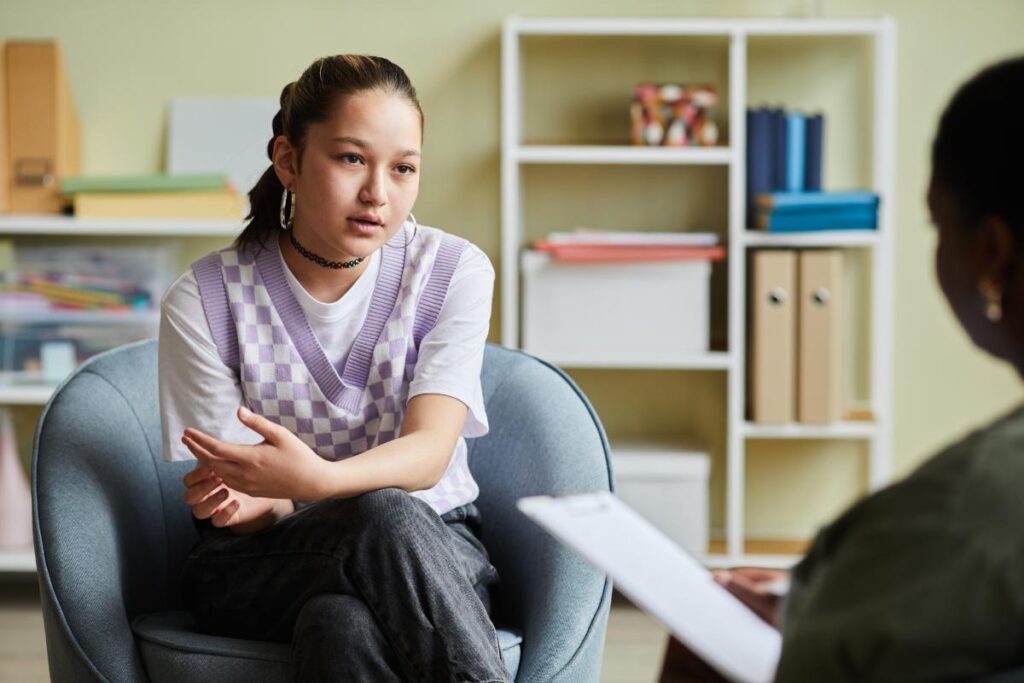The teenage years can be an incredibly tumultuous time in a person’s life. As teens navigate school, social circles, and the emotional rollercoaster that is puberty, they may experience challenges in their relationships. While some aspects of teenage relationships are normal and healthy, unhealthy or abusive relationships can profoundly impact physical and mental well-being. Fortunately, relationship therapy for teens can help your loved one recover.
If you are concerned about your teen’s relationships or recognize any telltale signs, we encourage you to contact our expert team at Imagine Seattle. Our compassionate and knowledgeable clinicians are here to help your teen develop healthy and positive relationships. A compassionate team member can help you schedule a consultation and take the first step toward a happier and healthier future.
Learn more about teen relationship therapy and how Imagine Seattle can help by calling 888.346.0473 today.
Signs Your Teen Needs Relationship Therapy
As a parent or caregiver, navigating the complexities of a teenager’s emotional state can be challenging. Here are some signs your teen needs relationship therapy:
- Isolation – If your teen has suddenly become more withdrawn or isolates themselves from family or friends, it could be a sign that they are experiencing relationship challenges.
- Mood swings – Teens are known for their emotional outbursts, but if you notice more frequent and intense mood swings, mainly when interacting with a specific person, it may be a sign of an unhealthy relationship.
- Changes in behavior – If your teen suddenly engages in risky behavior or acts out of character, it may be a red flag that they are experiencing stress or anxiety in their relationships.
Unhealthy relationships can also significantly impact a person’s physical health. If your teen is experiencing unexplained weight loss, headaches, or other physical symptoms, it may be a sign that they are struggling with a challenging relationship.
Does My Teen Need Relationship Counseling?
If you are unsure whether or not your loved one would benefit from relationship therapy for teens, it can be helpful to explore their current relationships. Consider the following questions:
- Are their relationships causing them more stress or anxiety than they are providing support and joy?
- Are they experiencing physical or emotional abuse?
- Are they isolating themselves from family or friends due to their relationships?
If the answer to these questions is yes, it may be time to consider teen therapy.
What to Expect from Relationship Therapy for Teens
Relationship therapy focuses on helping teens develop healthy and positive relationships, both with others and with themselves. Teens are encouraged to explore their feelings and thoughts about their relationships in a safe and supportive environment.
At Imagine Seattle, our relationship therapy programs incorporate various evidence-based practices, including cognitive-behavioral therapy (CBT), family therapy, and trauma-informed care. Our highly trained clinicians work collaboratively with our patients and their families to develop personalized treatment plans that address their unique challenges and goals.
We recognize that every teen’s journey is unique, and we take an individualized approach to each patient. Our PHP and IOP programs provide comprehensive assessments at the front end to identify patient needs and then leverage evidence-based treatments to create lasting change.
Begin Teen Relationship Therapy Today at Imagine Seattle
At Imagine Seattle, we understand that every teenager is unique and may require different approaches to therapy. If you are concerned about your teen’s relationships or mental health, please get in touch with us today. Our team supports you and your family through this challenging time. We can be reached by phone at 888.346.0473 or through our online form. Let us help your teen develop the skills to manage their emotions, relationships, and mental health effectively.




